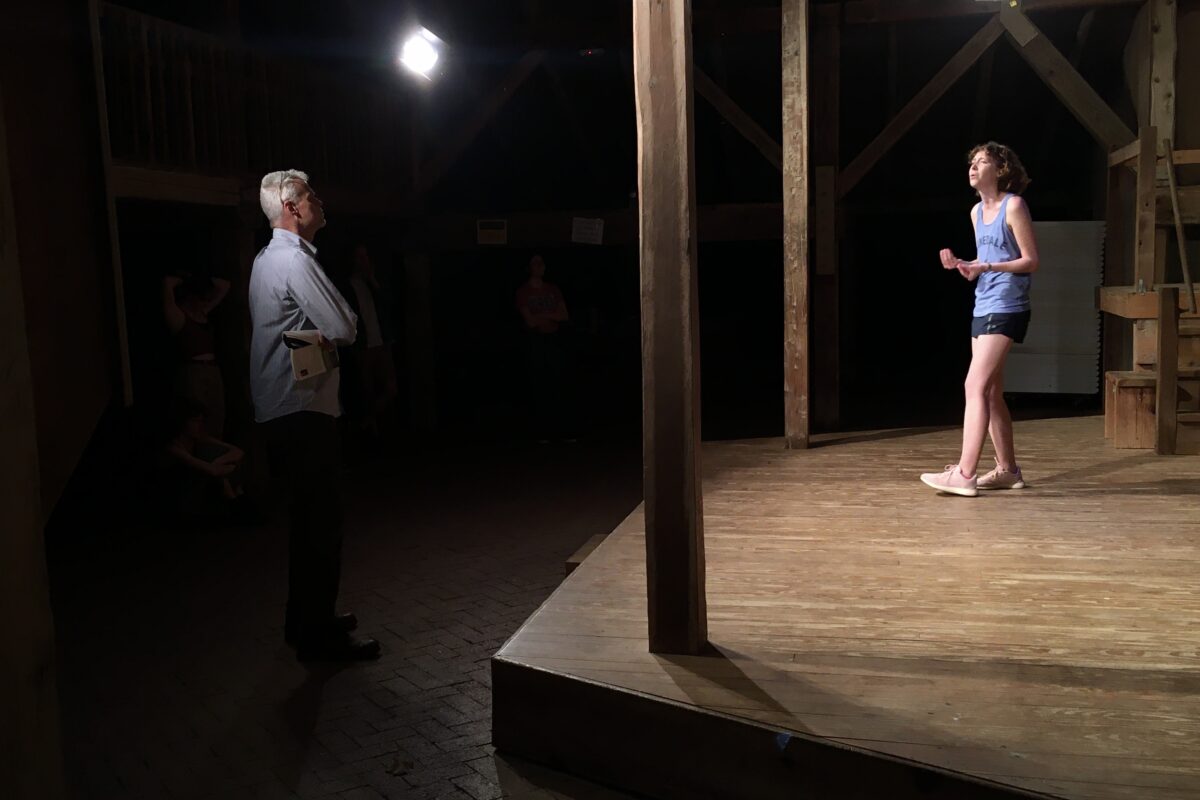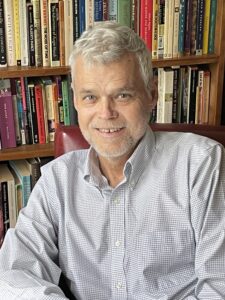Students in UT Austin’s famous Shakespeare at Winedale program, in which undergraduates learn and perform Shakespeare at a converted hay barn an hour east of the Texas capital, often push theater’s “the show must go on” maxim to the edge. In the nearly 60 years since the program was founded by James “Doc” Ayres, its student thespians have faced summer storms, power outages, and the challenge of performing during the COVID-19 pandemic. Now, Shakespeare at Winedale’s longtime leader, James Loehlin, faces an off-stage challenge: cancer. But Loehlin’s commitment to Winedale isn’t wavering, and he’s confident that this is another hurdle the program and its students will overcome.
Once a student at Winedale himself, Loehlin first encountered the program in the summer of 1983 after taking a World Literature course with Doc Ayres. Studying under Ayres “was a totally transformative experience for me that connected me with classmates, many of whom became lifelong friends, and with the study of Shakespeare,” Loehlin says. “It made me feel that this was something I could commit my life to.”
And commit he did. After spending an additional summer at Winedale in 1984, Loehlin dedicated his post-graduate career to studying the Bard and teaching Shakespeare at schools like Stanford, Dartmouth, and Oxford. Then, after Doc Ayres retired as head of the program in 2001, Loehlin returned to UT to serve as Winedale’s director. Now, as the leader of the troupe, Loehlin witnesses the magic of Shakespeare through performance year after year.
Winedale’s magic has almost as much to do with the property itself — and the seclusion and creativity it fosters — as it does with Shakespeare’s language and characters, Loehlin says. Composed of a collection of 19th and early 20th century buildings, Winedale’s crown jewel is a German hay barn that’s been transformed into a two-story Elizabethan-style stage. When working on a season of plays, the student cast and crew will spend weeks living, practicing, and performing within Winedale’s confines, fully immersed in the dreamlike atmosphere of works such as A Midsummer Night’s Dream and The Tempest.
“For the students, the world at Winedale feels closer to how Elizabethan contemporaries would have experienced it: closely connected to a rural past, to nature and to the products of the land,” Loehlin says. “It’s a pre-industrial, pre-technological space that lends itself to Shakespeare.”
The link between the Winedale setting and the experience of Shakespeare was particularly evident during the summer of 2003, Loehlin says, when the Winedale Barn was closed for construction. Forced to perform off-stage and outdoors, students decided to take their production of Julius Caesar in a new and unexpected direction. “They did the play outside, sort of wandering the grounds as night fell,” he remembers.“You could see the Roman conspirators emerging from the shadows of the crepe myrtle trees. There was no separation from the audience and it was thrilling—really thrilling.”
More than just a perfect locale, Winedale is also a culture and a history. Loehlin says his first summer with the program “had a very 1970s creative aspect to it” as the students connected their own time to the 16th century plays. Much has changed since that first summer —from the introduction of remote performance during the height of the COVID-19 pandemic to the reinterpretation of Shakespeare’s texts to reflect a more inclusive cultural climate—but one thing remains the same: Winedale students of every era find themselves through Shakespeare’s work.
Take Hamlet, for example. In the 50 years of Winedale’s existence, Loehlin said that Shakespeare’s iconic play never fails to reveal something timeless and new to the students who perform it. “Hamlet is a play that goes to the heart of personal identity and defining oneself,” Loehlin says, “which is a project that a lot of young people in college are confronting. Students from every Winedale class are able to relate those characters and their struggles.”
These days, Loehlin himself is finding new ways to relate to Shakespeare’s stories. Since his cancer diagnosis last summer, mere days before the start of the 2022 Winedale summer program, Loehlin has been balancing his ongoing treatment with the demands of running the program. That’s meant FaceTiming into rehearsals and relying more on the support of the broader Winedale community, but it also meant revisiting the Bard’s words with new eyes. In particular, a line from King Lear echoes in his mind.
“When King Lear is nearing the very end of his life in the last scene, one of his final lines is ‘Pray you undo this button. Thank you, Sir.’” Loehlin says. “I find it a very moving line, because he has been reduced to an acknowledgment of his own humanity and vulnerability, his need for the care of others. One of the side effects of my chemo is numbness and loss of dexterity in my fingers, and I think of Lear’s line every time I have to ask my wife to help button or unbutton my shirts, which is pretty often. I hope I accept her help, and the help of others, with the grace Lear learns to.”
That’s not to say that Loehlin’s planning to step away from his commitments to Winedale, his students, or Shakespeare’s great plays.
“I’m determined to stay at Winedale as long as I can,” he says. “I anticipate certainly doing it this summer, I would hope to do it next summer as well. I’d like to make it to at least 25 years. Doc Ayres did it for 30. I’d be satisfied with 25.”


